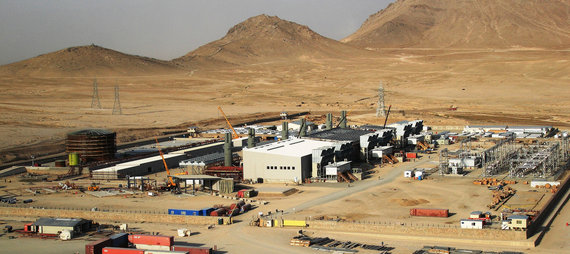The US has spent some $110 billion on Afghanistan's reconstruction. More than half ($60 billion) has gone to build the Afghan security forces, including the Afghan National Army and the various police forces. The balance was spent on infrastructure such as roads, schools, hospitals, power plants, and so on. To put the situation in perspective, the Marshall Plan to rebuild Europe in the aftermath of World War II cost about $103 billion in today's dollars. But unfortunately unlike Europe in the 1950s, neither the US nor the Afghan government has a lot to show for the vast amount of funds spent in Afghanistan. The Afghan security forces continue to be seriously challenged by the insurgency and a high attrition rate. And much of the infrastructure is in shambles. The thankless job of discovering the waste and conveying the bad news falls on the shoulders of John Sopko, the Special Inspector General for Afghanistan Reconstruction (SIGAR).
In a recent interview with Al-Jazeera, Sopko attributed the disappearance of taxpayer dollars to waste, fraud and abuse. As an example of waste, $400 to $500 million was spent on the purchase of airplanes for the Afghan Air Force (AAF). The AAF could not use the planes because they were not right for the country. Therefore the planes had to be destroyed. Mr. Sopko also mentioned fraud and abuse in implementing the reconstruction projects.
John Sopko said that much of the money has been spent on projects that the Afghans don't know how to use or for which they have no need. This remark reminded me of what I experienced when I worked for the US Department of State at the Kandahar Provincial Reconstruction Team (KPRT) in 2009 and 2010. The KPRT was a bi-national (Canadian/American) organization tasked to help Afghans with reconstruction projects and governance, among other projects. I was surprised by the US Agency for International Development's (USAID) and the Canadian International Development Agency's (CIDA) spending on projects of which sometimes the Afghan provincial officials were not even aware. More often than not we went ahead despite their objections. Kandahar Governor Wesa and others would object because they could not sustain the projects and they were not needed. One of those officials was the late Mayor of Kandahar City, Haidar Hamidi. Mayor Hamidi was very critical of wasting of the aid money on infrastructures such as schools. He called them buildings, not schools, because they lacked the necessary teachers and educational materials to be called schools. CIDA had financed the construction of a plastics factory, however no one knew where it was and how it fit in the local economic development plan. When Governor Wesa was made aware of it, he became very upset and frustrated. The Canadians also pushed for the installation of solar powered lights in Kandahar City over the objections of Mayor Hamidi. The project was a failure. Many lights did not work, some were on during the day and off at night! The United Nations Development Project (UNDP) had built a bathhouse in the city, but there was no running water, obviously a necessary component of a bathhouse. The waterless bathhouse was soon destroyed by vandals who could use the building's hardware elsewhere. Mayor Hamidi, assassinated on the job in July 2011, was also an American citizen who did not want his taxes wasted on bad projects.
The Afghan Minister for Energy and Water, Ali Hamad Osmani, recently declared that a serious chronic malaise continues to afflict the electric power generation industry in the country. He singled out Kandahar, Herat and Nangarhar (all major provinces) where angry people took to the streets to protest the lack of adequate and reliable power. But the problem of power shortages also adversely affects the capital Kabul. Osmani gave incompetence, lack of technical expertise and funding, and corruption as the reasons for the malaise. Coincidentally, SIGAR has been alarmed by problems plaguing the Tarakhil Power Plant in the eastern outskirts of Kabul and has asked USAID for a report due next month.
The Tarakhil Power Plant in Kabul. Photo by Flicker.
The Tarakhil project was launched in 2007 by the USAID at a cost of $335 million of taxpayer money. The contract for building the power plant was awarded to Louis Berger/Black & Veatch in a joint venture. It employs diesel fuel generators and was slated as a back up to compensate for power shortages in Kabul. After much delay, poor contractor performance and cost overruns, it was finally handed over to the Afghan authorities in 2010. The USAID Office of Inspector General conducted an audit in 2014 to assess the performance of the power plant. It found that the 105 megawatt power plant was constantly and severely underused at only 2.2% of its capacity. The cost of fuel alone is about $245 million per year, which the Afghan government cannot afford. The USAID has indicated that it has put corrective actions in place to help the Afghan government run the power plant more efficiently, but does that mean that the US taxpayer have to foot the $245 million per year fuel bill? As a mountainous country with ample water, Afghanistan could use cheaper hydropower to meet its energy needs. In the 1960s and 70s all of Afghanistan's power needs were generated by hydro-electric power plants. But the current corrupt, incompetent and divided Afghan government is not capable of turning the situation around anytime soon. Its problems are compounded by the security situation and an ever increasing assertive Taliban. In the meantime the US continues to pay for their incompetence and bills.

